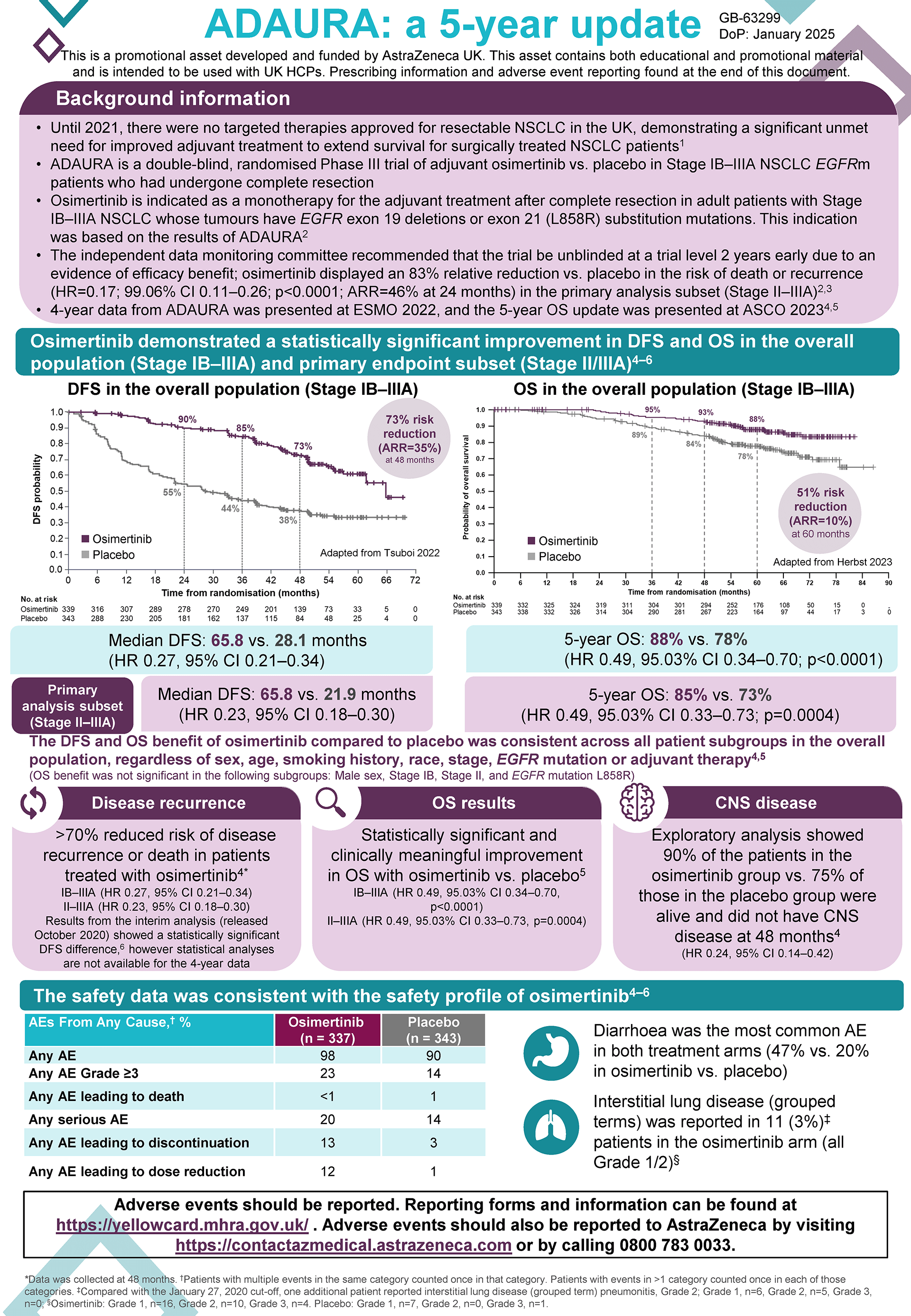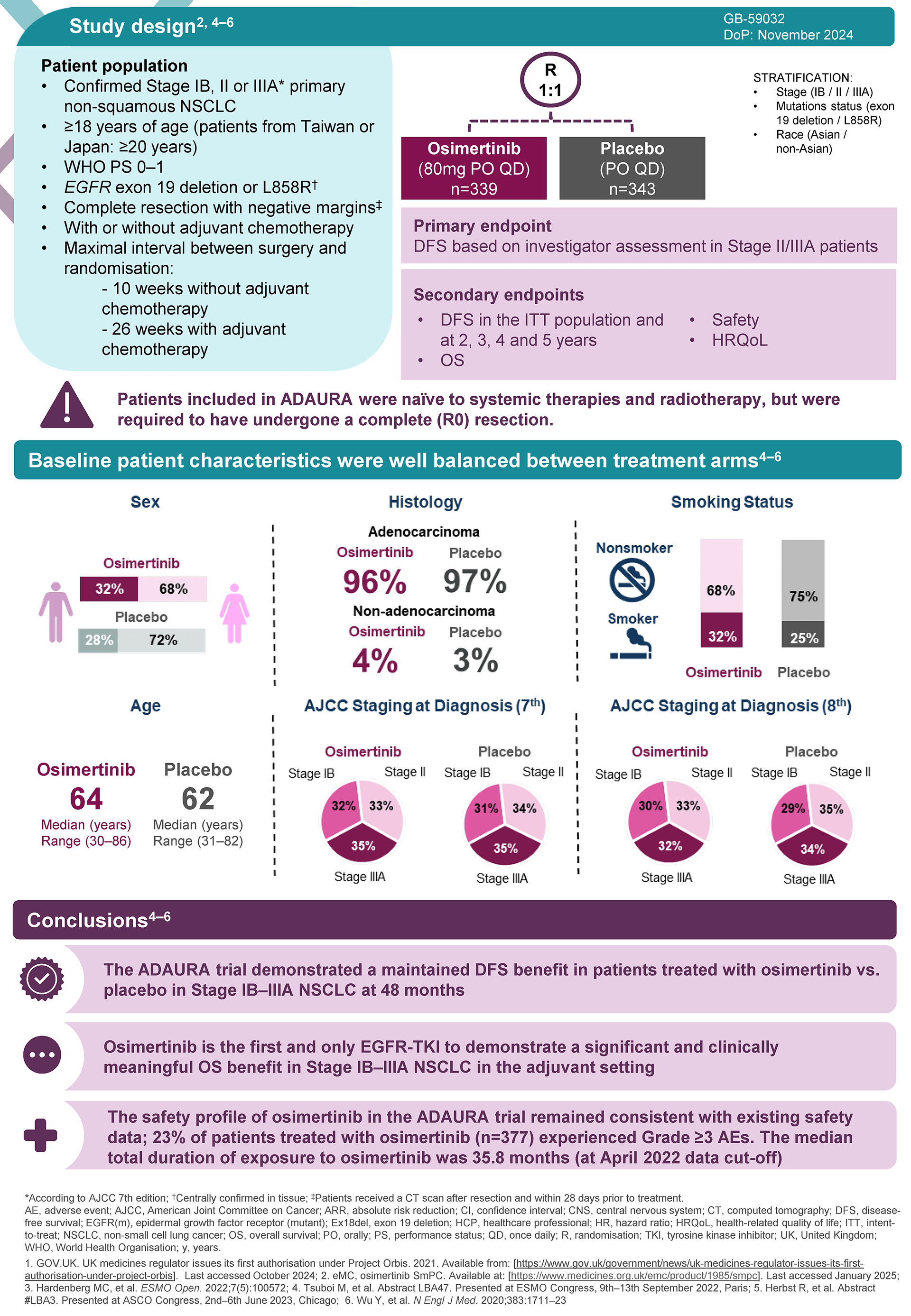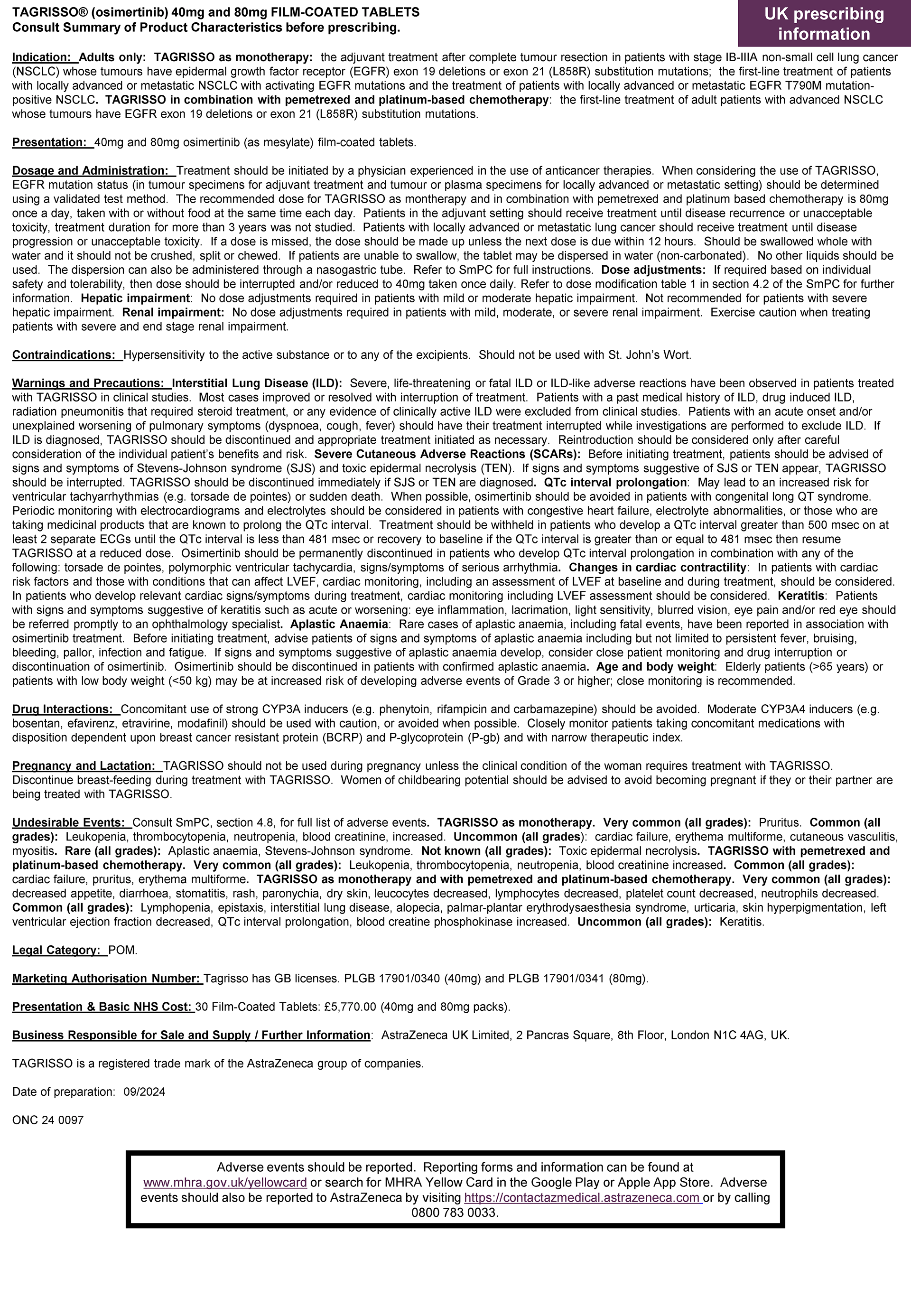Epidermal growth factor receptor mutation (EGFRm) testing is an essential step to identify non-small cell lung cancer (NSCLC) patients who are eligible for treatment with EGFR tyrosine kinase inhibitors (EGFR-TKIs).1,2 This means eligible patients may benefit from therapies such as TAGRISSO (for details of these, please visit the Data page).
EGFRm can be identified using tissue testing or circulating tumour DNA (ctDNA) testing (please note ctDNA testing is only suitable in advanced NSCLC). Tissue testing is preferred over ctDNA at diagnosis, as this facilitates full biomarker profiling, as well as histological diagnosis.3,4 According to the National Optimal Lung Cancer Pathway (NOLCP), molecular testing results should be available within 10 working days of biopsy.5
Why test for EGFR mutations at disease diagnosis?
Dr Matthew Evison, Consultant Respiratory Physician, Manchester University NHS Foundation Trust

Summary of the recommended EGFR mutation testing pathway at diagnosis and the impact on treatment choices in NSCLC1,4,6,7
Centres can organise their ordering of NSCLC biomarker testing in different ways:
Bespoke testing: when an oncologist orders tests for each individual patient8
VS
Reflex testing: when a standard group of pre-approved biomarker tests is ordered at the time of initial cancer diagnosis8
There are a number of benefits of reflex testing compared to bespoke testing, including reduced turnaround time, and streamlining pathology workloads.8–10 Click this link to learn more about reflex testing in NSCLC.
ctDNA can be utilised in first and second-line advanced NSCLC settings if tissue biopsy is not feasible. This is particularly useful in the ≤30% of patients who do not have tissue biopsy results (which can be due to lack of available tissue, low-quality samples or poor health that prevents them from undergoing biopsy procedures), and to prevent multiple invasive biops procedures to re-test patients who have progressed on EGFR-TKIs.11
How is EGFR testing conducted at your centre? Do you receive the results within the 10 days recommended by the NOLCP?
Reach out to the AstraZeneca Diagnostics Team if you would like to discuss EGFR testing strategies in more detail contact us here.
References
- Planchard D, Popat S, Kerr K, et al. Metastatic non-small cell lung cancer: ESMO Clinical Practice Guidelines for diagnosis, treatment and follow-up. Ann Oncol Off J Eur Soc Med Oncol. 2018;29(Suppl 4): iv192–iv237. Updated version published 15 September 2020.
- NICE. EGFR‑TK mutation testing in adults with locally advanced or metastatic non-small-cell lung cancer. Available from: https://www.nice.org.uk/guidance/dg9/resources/egfrtk-
mutation-testing-in-adults-with-locally-advanced-or-metastatic-nonsmallcell-lung-cancer-pdf-29280700357 (last accessed January 2025). - Dietel M, Bubendorf L, Dingemans A-MC, et al. Diagnostic procedures for non-small-cell lung cancer (NSCLC): recommendations of the European Expert Group. Thorax. 2016;71(2):177-184.
- Normanno N, Denis MG, Thress KS, Ratcliffe M, Reck M. Guide to detecting epidermal growth factor receptor (EGFR) mutations in ctDNA of patients with advanced non-small-cell lung cancer. Oncotarget. 2017;8(7):12501–12516.
- NHS England. National optimal lung pathway. version 4.0, updated 2024. Available at: https://www.cancerresearchuk.org/sites/default/files/national-optimal-lung-cancer-pathway_v4_01jan2024.pdf (last accessed January 2025)
- Electronic Medicines Compendium. TAGRISSO 80 mg film-coated tablets – Summary of Product Characteristics (SmPC) – (emc). UK link available from: https://www.medicines.org.uk/
emc/product/7615/smpc (last accessed January 2025). - Fiala C, Diamandis EP. Utility of circulating tumor DNA in cancer diagnostics with emphasis on early detection. BMC Med. 2018;16(1):166.
- Anand K, Phung TL, Bernicker EH, Cagle PT, Olsen RJ, Thomas JS. Clinical Utility of Reflex Ordered Testing for Molecular Biomarkers in Lung Adenocarcinoma. Clin Lung Cancer. 2020;21(5):437–442.
- Gregg JP, Li T, Yoneda KY. Molecular testing strategies in non-small cell lung cancer: optimizing the diagnostic journey. Transl Lung Cancer Res. 2019;8(3):286–301.
- Mok T, Carbone DP, Hirsch FR. IASLC Atlas of EGFR Testing in Lung Cancer – Guidebook. Editorial Rx Press, North Fort Myers, FL, U.S.A.; 2017. Available from: https://www.iaslc.org/
research-education/publications-resources-guidelines/iaslc-atlas-egfr-testing-lung-cancer-guidebook (last accessed January 2025). - NICE. Plasma EGFR mutation tests for adults with locally advanced or metastatic non-small-cell lung cancer [MIB137]. January 2018. Available from: https://www.nice.org.uk/advice/
mib137/chapter/The-technologies (last accessed January 2025).



